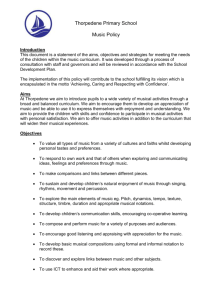Completed Initial Needs Analysis
advertisement
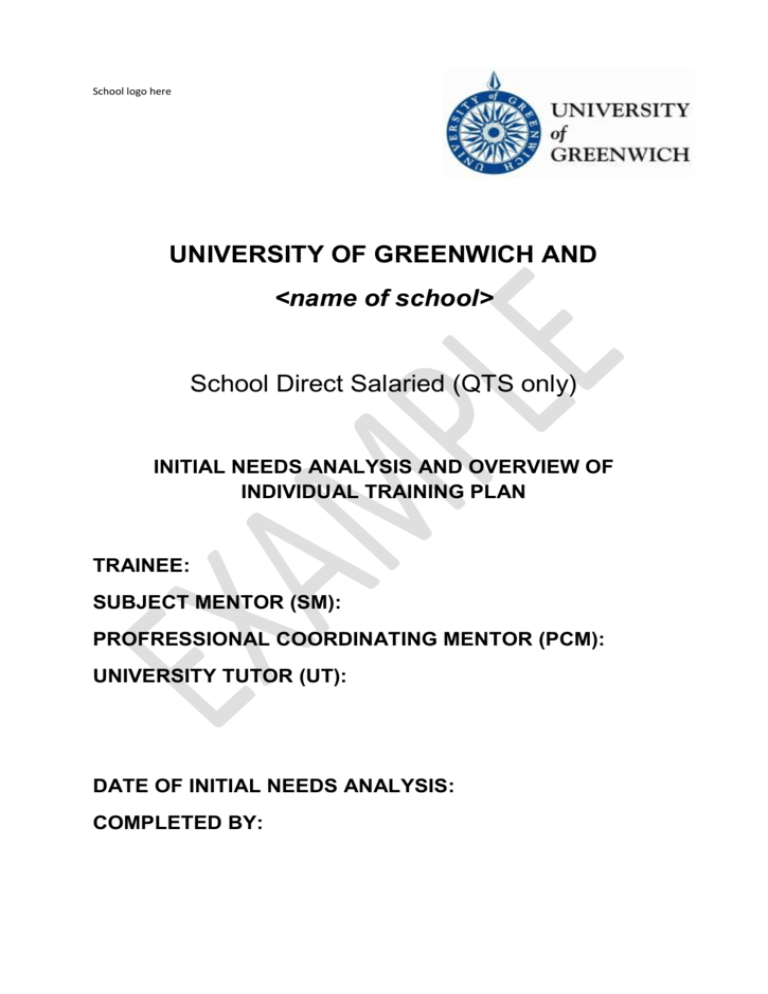
School logo here UNIVERSITY OF GREENWICH AND <name of school> School Direct Salaried (QTS only) INITIAL NEEDS ANALYSIS AND OVERVIEW OF INDIVIDUAL TRAINING PLAN TRAINEE: SUBJECT MENTOR (SM): PROFRESSIONAL COORDINATING MENTOR (PCM): UNIVERSITY TUTOR (UT): DATE OF INITIAL NEEDS ANALYSIS: COMPLETED BY: A - TRAINEE STATEMENT (e.g. introduction to themselves, their views on Education, why they want to teach, goals for their future in the profession etc) I have been involved in teaching since the age of 10 when I started to help supervise and teach 4-5 year olds about pony care at the local Pony Sanctuary. At the age of 12 I started teaching the recorder and, aided by opportunities and experiences presented to me whilst I was a student at <school>, it wasn’t long before I realised teaching was a career I wanted to pursue. Music has always been my main passion and, after completing a music degree I was keen to follow a career that would allow me to use my musical knowledge and experiences to teach and benefit young people. I feel I have been very lucky to work at <school> as I have had some fantastic opportunities here and I thoroughly enjoy my work. I have been able to use my musical skills as a pianist, saxophonist and singer to enhance the learning of the students at the school. I work with students across a wide ability range and really enjoy helping students to achieve their very best. I have learnt a great deal during my work at <school> which I feel puts me at an advantage for entering teacher training. My time spent in the class room and observing lessons has shown me examples of outstanding lessons and teaching techniques as well as teaching me how best to work with students to aid their learning. From attending INSETs, meetings and extracurricular activities I feel I have also extended my knowledge in other areas including how to help students with different SEN, assessment for learning, strategies for successful teaching and learning, and understanding the psychological needs of students, as well as school visits, first aid and pastoral care. The place of music in education is a topic that comes up in the news on a fairly regular basis. Music is often seen as inferior to the ‘more important’ core subjects such as Maths, English and Science and I am fully aware that, in some people’s eyes, music is seen as a waste of time. This is something that I disagree with entirely. Whilst I was at school I saw my music lessons as an enjoyable release from the more academic lessons. I relished the opportunity to be creative and the freedom we were given to learn in an environment that was so different from other lessons. I see the same attitudes in students at <school>. Students who are known for poor behaviour are often transformed in a musical situation. They are given the chance to take control, express themselves in a different way and develop knowledge and skills in a whole different way to other school lessons. Many studies have been conducted on the effects of music to the brain and scientists have said that children who are exposed to music, or those who play an instrument, do better in other school subjects than those who don't. Recent research suggests exposure to music may benefit a child's reading age, IQ and the development of certain parts of the brain. Aside from this music education can provide discipline and challenge as well as being a fun activity, relieving stress and giving students a great sense of achievement. I also believe in music’s value in education as music, as a whole, is an expensive past time. Some students could simply not afford to play a musical instrument and would not have access to such items outside of the school environment. Once I have completed my training I am hopeful of following a successful career as a music teacher. I hope my work inspires young people of varying ages and backgrounds and helps them to develop into well-rounded individuals, whilst I also work to increase participation as well as nurturing and encouraging creativity and enjoyment within music education. B QUALIFICATIONS FOR ENTRY TO THE PROGRAMME Degree (indicate main content areas in relation to the subject training): BMus (Hons) Canterbury Christ Church University (2010) Additional qualifications (and their relevance): Grade 8 Recorder (Merit), Grade 7 Piano (Merit), Grade 6 Violin (Pass). C PREVIOUS EXPERIENCE AND ACHIEVEMENTS Skills and experience of teaching, training and assessing others: (i) In school-based settings Teaching Assistant at <school> 1 weeks work experience at <primary school> Conductor and supervisor (ii) In other settings Recorder teacher at New Ash Green Music Workshop Pony Club teacher at Foxendown Pony Sanctuary Tutor on Junior Singing Courses at Benenden School Assistant at adult dance classes at Goodmans Dance Centre Skills and experience of working in other settings (relevant to the training): Volunteer at local Oxfam events (fetes, fashion shows etc) Volunteer helper at Gravesham Festival of Music and Speech Campsite Security worker at Leeds Festival Other relevant activities (e.g. membership of professional associations, involvement with a Governing Body etc.): Committee member for Friends of Rochester Music Centre (2011-2013) Youth representative on the committee for Hartley Players (Local amateur dramatics group) (2006-2009) Trustee for a Health and Fitness charity in New Ash Green (Current) Statement written by PCM reviewing all qualifications, previous experience and achievements. As relevant, please reference to the Standards for QTS. X starts her training with experience of working as a teaching assistant at The <school>), a musical instrument teacher and a singing tutor. She has experience as a volunteer using her musical skills and administration skills. She has an awareness of the need to inspire students with differing prior experience of music. As part of working as a volunteer and an employee in school she has a good understanding of appropriate professional confidentiality and the ability to work as a team. In her role as a teaching assistant she has worked with the gifted year 7s and 8s and worked the students who additional educational needs. She has planned and taught units of work in the school’s star skills scheme for year 7 and 8. Training needs identified: X’s training focus will be to develop a fuller understanding of the role and responsibilities of a teacher. The need to plan thoroughly for the needs of all the students she teaches and to plan and teach so that progress is made by all students in all lessons. There are some specific areas of subject knowledge that X will be working on through the year. D REVIEW OF INITIAL SUBJECT KNOWLEDGE AUDIT PCM statement identifying training needs arising directly from Initial Subject Knowledge audit: Ref. Standard 3 Demonstrate good subject and curriculum knowledge. X has a sound musical knowledge and understanding demonstrated by her work as a teaching assistant in the Music department in <school>, her musical qualifications in recorder, piano and violin and her voluntary work particularly as a singing tutor. Her knowledge of KS3 and KS4 is very good demonstrated by her working as a teaching assistant. Training needs identified: X’s subject audit has identified these areas to be developed through the course – Knowledge of music from other cultures Basic practical skills on bass guitar and drums Further knowledge of music technology, in particular studio recording techniques relevant to the A level Music Technology course SCHOOL DIRECT (SALARIED - QTS ONLY) INITIAL NEEDS ANALYSIS AND OVERVIEW OF TRAINING PLAN AGAINST THE STANDARDS FOR QTS Trainee’s name: Main School name, address, phone number and email address: Subject focus: Subject Mentor name: PCM name: University Tutor name: Second School name, address, phone number and email address: Subject Mentor name: PCM name: Dates of second placement: If the candidate already meets some of the QTS Standards, please say what records of evidence from the initial needs assessment show this. PART ONE: TEACHING S1 Set high expectations which inspire, motivate and challenge pupils • establish a safe and stimulating environment for pupils, rooted in mutual respect • set goals that stretch and challenge pupils of all backgrounds, abilities and dispositions • demonstrate consistently the positive attitudes, values and behaviour which are expected of pupils. All trainees to be awarded QTS will have demonstrated as a minimum that: They are able to encourage pupils to participate and contribute in an atmosphere conducive to learning. In the course of differing school experiences they have shown that they have set appropriately high expectations, believing that all pupils have the potential to make progress. They are able to develop a rapport with a range of individuals and groups. As a consequence of this most pupils are engaged in their learning. They consistently demonstrate professional behaviour, respect for pupils, colleagues, parents and carers and support the ethos of the school. They demonstrate enthusiasm for working with children and young people and for teaching and learning. Please indicate which parts of the Standard have been met or partially met by the trainee’s experience and the nature of the evidence. X has experience working as a teaching assistant at <school>. She has demonstrated An understanding of the importance of working within the ethos of a secondary school A high level of professionalism Ability to work as a team member Be a positive role model for the students Overview of Standards which are to be the focus of the training plan. Motivate students by setting high expectations Differentiation – Challenge for all The Learning Environment
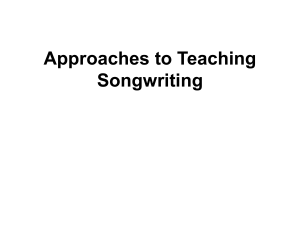
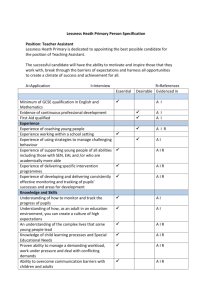

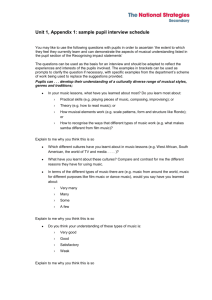
![afl_mat[1]](http://s2.studylib.net/store/data/005387843_1-8371eaaba182de7da429cb4369cd28fc-300x300.png)


